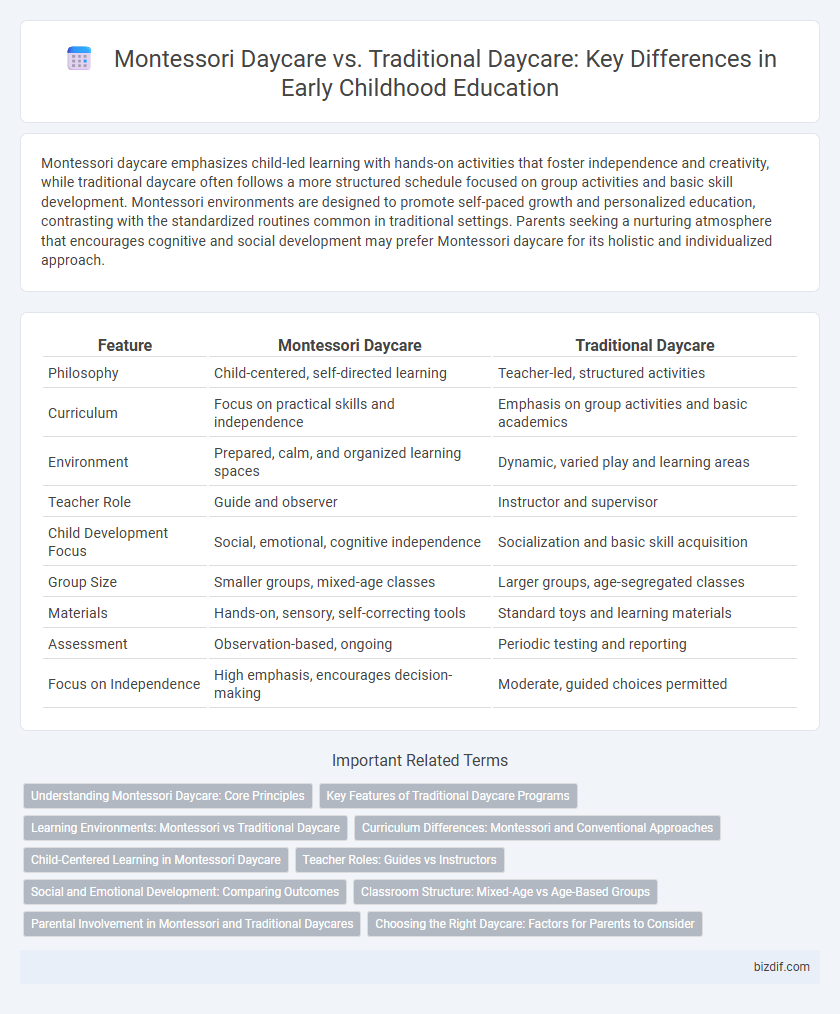Montessori daycare emphasizes child-led learning with hands-on activities that foster independence and creativity, while traditional daycare often follows a more structured schedule focused on group activities and basic skill development. Montessori environments are designed to promote self-paced growth and personalized education, contrasting with the standardized routines common in traditional settings. Parents seeking a nurturing atmosphere that encourages cognitive and social development may prefer Montessori daycare for its holistic and individualized approach.
Table of Comparison
| Feature | Montessori Daycare | Traditional Daycare |
|---|---|---|
| Philosophy | Child-centered, self-directed learning | Teacher-led, structured activities |
| Curriculum | Focus on practical skills and independence | Emphasis on group activities and basic academics |
| Environment | Prepared, calm, and organized learning spaces | Dynamic, varied play and learning areas |
| Teacher Role | Guide and observer | Instructor and supervisor |
| Child Development Focus | Social, emotional, cognitive independence | Socialization and basic skill acquisition |
| Group Size | Smaller groups, mixed-age classes | Larger groups, age-segregated classes |
| Materials | Hands-on, sensory, self-correcting tools | Standard toys and learning materials |
| Assessment | Observation-based, ongoing | Periodic testing and reporting |
| Focus on Independence | High emphasis, encourages decision-making | Moderate, guided choices permitted |
Understanding Montessori Daycare: Core Principles
Montessori daycare emphasizes child-centered learning, fostering independence through hands-on activities and mixed-age classrooms that promote peer learning. The environment is carefully designed to encourage exploration, sensory development, and self-discipline, contrasting with the structured routines typical of traditional daycare. Core principles include respect for a child's natural development pace, freedom within limits, and a prepared environment that supports cognitive and emotional growth.
Key Features of Traditional Daycare Programs
Traditional daycare programs emphasize structured schedules, group activities, and teacher-led instruction to support early childhood development. These centers often follow state regulations and licensing requirements, providing standardized curricula and assessment methods. Safety protocols, socialization opportunities, and basic educational activities are key components designed to meet the needs of diverse children in a supervised environment.
Learning Environments: Montessori vs Traditional Daycare
Montessori daycare environments emphasize child-led learning through carefully prepared, hands-on materials that foster independence and sensory exploration. Traditional daycare settings often rely on structured schedules and teacher-directed activities aimed at group learning and routine. This fundamental difference in learning environments influences developmental outcomes, with Montessori spaces encouraging self-paced mastery and traditional daycares promoting social interaction and adherence to group norms.
Curriculum Differences: Montessori and Conventional Approaches
Montessori daycare curriculum emphasizes self-directed learning, sensory-based activities, and hands-on materials that foster independence and creativity in children aged 2 to 6 years. Traditional daycare programs typically follow a structured schedule with teacher-led group activities, focusing on basic academic skills and socialization. The Montessori approach adapts to each child's individual developmental pace, while conventional methods often use standardized lessons and assessments.
Child-Centered Learning in Montessori Daycare
Montessori daycare emphasizes child-centered learning by allowing children to explore activities at their own pace within a prepared environment designed to foster independence and creativity. This approach contrasts with traditional daycare, which often follows a fixed schedule and teacher-directed curriculum, potentially limiting personalized developmental opportunities. Research shows that Montessori methods enhance cognitive and social skills through hands-on learning and self-directed play, promoting holistic child development.
Teacher Roles: Guides vs Instructors
Montessori daycare teachers serve as guides, facilitating individualized learning and encouraging children's natural curiosity through hands-on activities tailored to their developmental stages. In contrast, traditional daycare instructors often follow a structured curriculum with direct teaching methods, emphasizing group instruction and routine-based activities. This difference in teacher roles significantly impacts children's engagement, autonomy, and ability to develop critical thinking skills in early childhood education settings.
Social and Emotional Development: Comparing Outcomes
Montessori daycare programs emphasize self-directed activity and collaborative play, fostering stronger social skills and emotional intelligence in children compared to traditional daycare settings. Research shows Montessori children often display greater empathy, emotional regulation, and conflict resolution abilities due to their approach to mixed-age group interactions and hands-on learning. Traditional daycare environments may provide structured socialization but typically lack the individualized attention that supports deeper emotional development.
Classroom Structure: Mixed-Age vs Age-Based Groups
Montessori daycare classrooms feature mixed-age groups, fostering peer learning and social development as younger children observe and imitate older peers, while traditional daycare typically organizes children into age-based groups that emphasize age-specific activities and milestones. Mixed-age settings in Montessori environments support individualized pacing and collaborative problem-solving, contrasting with the standardized curriculum and uniform progression in age-segregated classrooms. Research indicates mixed-age grouping enhances empathy, leadership skills, and adaptability in early childhood development compared to traditional single-age group structures.
Parental Involvement in Montessori and Traditional Daycares
Parental involvement in Montessori daycares typically centers on collaboration with educators to support the child's individualized learning path, promoting consistent development between home and school. In traditional daycares, parental involvement often focuses on routine updates and basic communication rather than active participation in the curriculum. Studies show that Montessori programs encourage parents to engage in workshops and observe classroom activities, fostering a deeper understanding of their child's progress and learning methods.
Choosing the Right Daycare: Factors for Parents to Consider
When choosing the right daycare, parents should consider the Montessori approach's emphasis on child-led learning, independence, and carefully prepared environments designed to foster natural development. Traditional daycare often focuses on structured routines, group activities, and socialization, which may suit children seeking more guided interaction. Evaluating a child's temperament, learning style, and the daycare's staff qualifications, safety standards, and educational philosophy helps ensure an optimal fit for early childhood development.
Montessori daycare vs traditional daycare Infographic

 bizdif.com
bizdif.com